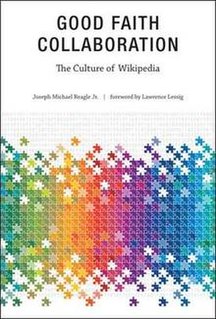
Sola fide, also known as justification by faith alone, is a Christian theological doctrine commonly held to distinguish many Protestant churches from the Catholic Church, the Eastern Orthodox Churches and the Oriental Orthodox Churches.
Faith is a religious belief.

Bad faith is double mindedness or double heartedness in duplicity, fraud, or deception. It may involve intentional deceit of others, or self-deception.
Impartiality is a principle of justice holding that decisions should be based on objective criteria, rather than on the basis of bias, prejudice, or preferring the benefit to one person over another for improper reasons.
Within the Latter Day Saint movement, the Articles of Faith is a statement of beliefs composed by Joseph Smith as part of an 1842 letter sent to "Long" John Wentworth, editor of the Chicago Democrat, and first published in the Latter Day Saint newspaper Times and Seasons. It is a concise listing of thirteen fundamental doctrines of Mormonism. Most Latter Day Saint denominations view the articles as an authoritative statement of basic theology. Some denominations, such as The Church of Jesus Christ of Latter-day Saints, have adopted the articles as scripture. For some sects, the Articles of Faith are known collectively as "An Epitome of Faith and Doctrine".
Uberrima fides is a Latin phrase meaning "utmost good faith". It is the name of a legal doctrine which governs insurance contracts. This means that all parties to an insurance contract must deal in good faith, making a full declaration of all material facts in the insurance proposal. This contrasts with the legal doctrine caveat emptor.
Insurance bad faith is a legal term of art unique to the law of the United States that describes a tort claim that an insured person may have against an insurance company for its bad acts. Under United States law, insurance companies owe a duty of good faith and fair dealing to the persons they insure. This duty is often referred to as the "implied covenant of good faith and fair dealing" which automatically exists by operation of law in every insurance contract.
The Unfair Terms in Consumer Contracts Regulations 1999 is an old UK statutory instrument, which had implemented the EU Unfair Consumer Contract Terms Directive 93/13/EEC into domestic law. It replaced an earlier version of similar regulations, and overlaps considerably with the Unfair Contract Terms Act 1977.
In Christian theology, good works, or simply works, are a person's (exterior) actions or deeds, in contrast to inner qualities such as grace or faith. In Judaism, a good work is also known in Hebrew as a mitzvah, and refers to a moral deed performed within a religious duty. As such, the term mitzvah has also come to express an individual act of human kindness in keeping with the law. The expression includes a sense of heartfelt sentiment beyond mere legal duty, as "you shall love your neighbor as yourself". Islamic theology holds that salvation is a combination of the grace of Allah and the works performed by the individual. On the Day of Judgment, if an individual's bad deeds are outweighed by their good works, he or she will be forgiven of all sin and then enter into Jannah (Paradise).

The Housing for Older Persons Act of 1995 (HOPA) amends Title VIII of the Civil Rights Act of 1968. The consolidated Act is administered by the U.S. Department of Housing and Urban Development (HUD). The law was signed by President of the United States Bill Clinton on December 28, 1995.

Burger King Corporation v Hungry Jack's (2001) 69 NSWLR 558 was an Australian court case decided in the New South Wales Court of Appeal on 21 June 2001, concerning a dispute between United States-based fast food chain Burger King, and its Australian franchisee Hungry Jack's. It related to the breach of a business development agreement between the two companies, and the resulting attempts of Burger King to terminate the contract. The Court of Appeal decided that Burger King could not terminate the contract, for several reasons, one of which was that it was in breach of an implied term of good faith, having taken steps to engineer the breach of the contract.

Director General of Fair Trading v First National Bank plc [2001] UKHL 52 is the leading case on the Unfair Terms in Consumer Contracts Regulations 1999. It was an action to test the fairness of clauses in loan agreements which secured a bank's commercial interest rates after a debtor that had defaulted and they had been to court to determine their repayment scheme. The House of Lords held that the clause did not fall within the ambit of reg 6(2) and that it was valid in accordance with the fairness test. The case was brought by the Director General of Fair Trading on behalf of consumers.

Paloma Faith Blomfield is an English singer, songwriter, and actress.

Lenz v. Universal Music Corp., 801 F.3d 1126, is a decision by the United States Court of Appeals for the Ninth Circuit, affirming the ruling in 2008 of the US District Court for the Northern District of California, holding that copyright holders must consider fair use in good faith before issuing a takedown notice for content posted on the Internet.
Johnson v Unisys Limited [2001] UKHL 13 is a leading UK labour law case on the measure of damages for unfair dismissal and the nature of the contract of employment.

Anthony Tyrone Evans, Jr. is an American Christian singer and songwriter. Evans has made six studio albums during his career as a musician: Even More in 2004 with Epic Records, Letting Go in 2006 with Integrity Music, The Bridge in 2006 with EMI Gospel, Undisguised in 2010 with INO Records, Home in 2011 with Fair Trade Services, and Real Life/Real Worship in 2014 with Fair Trade Services.

The Fair Work Act 2009 is an Australian law passed by the Rudd Government after coming into power in 2007 to reform the industrial relations system in Australia. It replaced the previous Howard Government's WorkChoices legislation. It started operation on 1 July 2009.











